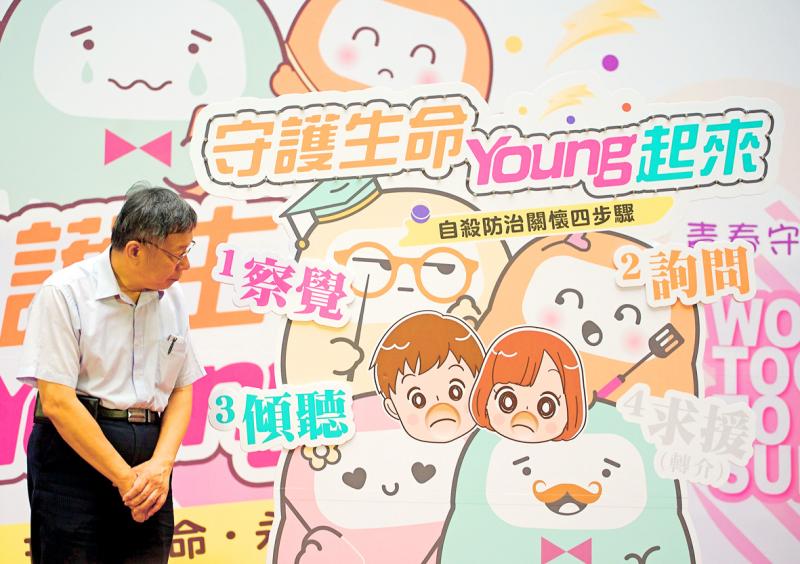The Taipei Department of Health yesterday said that the number of suicides of young people in the city has grown rapidly in the past two years, adding that mental health issues are the main reasons for suicidal behavior.
Last year, 339 people died from suicide in the city, a decline of 10 people from 2018, the department said, citing Ministry of Health and Welfare data.
However, the number of deaths from suicide among people aged 15 to 24 increased from 17 to 28, or by 64.7 percent, showing that suicide prevention measures for the age group needs immediate attention, it said.

Photo: CNA
The Taipei City Government yesterday held a news conference and set up an interactive display booth at Taipei City Hall to raise public awareness about suicide prevention.
The city government’s suicide prevention center said the top three reasons for suicidal behavior among young people last year was mental health issues (36.3 percent), family or intimate relationship problems (32.9 percent) and school adaptation problems (10.7 percent).
Taipei Mayor Ko Wen-je (柯文哲) said most people think that it is natural to seek medical attention when they are ill or injured, but many people feel embarrassed to see a doctor when they have emotional problems or suicidal thoughts.
However, in many cases, depression is linked to imbalances of neurotransmitter levels in the brain, and the condition can significantly improve after taking medication, he said, adding that although not all mental illnesses can be fully cured by treatment, they are likely to improve significantly.
Data suggest that the risk of suicidal behavior in people with suicidal intentions can be reduced by 63 percent in two years through psychotherapy, he said.
He urged people to remember the four steps — be cautious, ask, listen and refer — if they have friends or family members who seem to be have emotional problems, as sometimes showing concern by asking how they are and listening to them can help them feel better.
If they are experiencing depression, referring them to a psychiatrist or psychological counselor can help prevent suicide, Ko added.

Taiwan yesterday condemned the recent increase in Chinese coast guard-escorted fishing vessels operating illegally in waters around the Pratas Islands (Dongsha Islands, 東沙群島) in the South China Sea. Unusually large groupings of Chinese fishing vessels began to appear around the islands on Feb. 15, when at least six motherships and 29 smaller boats were sighted, the Coast Guard Administration (CGA) said in a news release. While CGA vessels were dispatched to expel the Chinese boats, Chinese coast guard ships trespassed into Taiwan’s restricted waters and unsuccessfully attempted to interfere, the CGA said. Due to the provocation, the CGA initiated an operation to increase

CHANGING LANDSCAPE: Many of the part-time programs for educators were no longer needed, as many teachers obtain a graduate degree before joining the workforce, experts said Taiwanese universities this year canceled 86 programs, Ministry of Education data showed, with educators attributing the closures to the nation’s low birthrate as well as shifting trends. Fifty-three of the shuttered programs were part-time postgraduate degree programs, about 62 percent of the total, the most in the past five years, the data showed. National Taiwan Normal University (NTNU) discontinued the most part-time master’s programs, at 16: chemistry, life science, earth science, physics, fine arts, music, special education, health promotion and health education, educational psychology and counseling, education, design, Chinese as a second language, library and information sciences, mechatronics engineering, history, physical education

The Chinese military has boosted its capability to fight at a high tempo using the element of surprise and new technology, the Ministry of National Defense said in the Quadrennial Defense Review (QDR) published on Monday last week. The ministry highlighted Chinese People’s Liberation Army (PLA) developments showing significant changes in Beijing’s strategy for war on Taiwan. The PLA has made significant headway in building capabilities for all-weather, multi-domain intelligence, surveillance, operational control and a joint air-sea blockade against Taiwan’s lines of communication, it said. The PLA has also improved its capabilities in direct amphibious assault operations aimed at seizing strategically important beaches,

‘MALIGN PURPOSE’: Governments around the world conduct espionage operations, but China’s is different, as its ultimate goal is annexation, a think tank head said Taiwan is facing a growing existential threat from its own people spying for China, experts said, as the government seeks to toughen measures to stop Beijing’s infiltration efforts and deter Taiwanese turncoats. While Beijing and Taipei have been spying on each other for years, experts said that espionage posed a bigger threat to Taiwan due to the risk of a Chinese attack. Taiwan’s intelligence agency said China used “diverse channels and tactics” to infiltrate the nation’s military, government agencies and pro-China organizations. The main targets were retired and active members of the military, persuaded by money, blackmail or pro-China ideology to steal